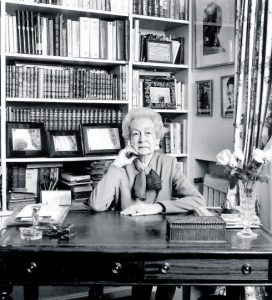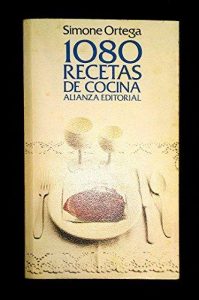The Indian mathematician Ramanujan claimed that each integer was his personal friend. Which, in a way, implies personalising numbers, imagining that each one of them has special characteristics, whatever they may be, that make it unique, one of a kind.

Indeed, that is what happens to 1080, which is much more than a number. 1080 is half the title of one of the most striking books published in Spain in the last half century. If she were still alive, its author would have just turned the round age of 100: she is Simone Klein Ansaldy, born in Barcelona on 29 May 1919. I am certain that many readers will not recognise this name, because she preferred to sign her books with her husband’s surname: José Ortega Spottorno.
Indeed, I am referring to Simone Ortega and her book 1080 recipes, which appeared in 1972 in Alianza Editorial. In fact, Alianza Editorial had been founded a few years earlier by Ortega Spottorno and was one of the cultural upheavals in the dark national Catholic Spain of the late 1960s (notably its collections El libro de Bolsillo and Alianza Universidad).
Apparently, Ortega Spottorno suggested to his wife to write a recipe book for Alianza’s pocket collection, based on the recipe notebooks that Simone Ortega, of French parents, kept from her grandmother and great-grandmother. This was the origin of 1080 recipes, a book that has since sold millions of copies. I read somewhere that Simone Ortega herself found it somewhere between embarrassing and comical that her book was competing in sales with the Bible and Don Quixote. I would go so far as to say that in the last third of the 20th century, 1080 had more impact on the real lives of many of its inhabitants in Spain than the Bible and Don Quixote put together, and it still haunts countless kitchens, giving shelter and refuge to those who toil there.

Today, after Arguiñano, Arzak, Ferran Adrià, the constellation of Michelin stars in Spanish restaurants and the culinary reality shows, it is difficult to imagine what a poor state gastronomy was in in late Francoist Spain, and how much Simone Ortega’s book meant for its improvement and modernisation. This includes both its enrichment with the habitual use of new or little-used foods and procedures, and its caloric adaptation (its defatting) to other nutritional needs of the population.
Returning to Ramanujan’s saying that opened this post, perhaps the best way to measure the impact of Simone Ortega’s book is to note that it has made number 1080 the personal friend of several generations of Spaniards.

Existe un libro del no menos célebre Karlos Arguiñano, que se titula “1069 recetas”. Cuando le preguntaron el porqué de esa cifra, contestó: “la idea es que fueran unas mil, y el número 69 me gusta”. Me pregunto qué opinaría Ramanujan